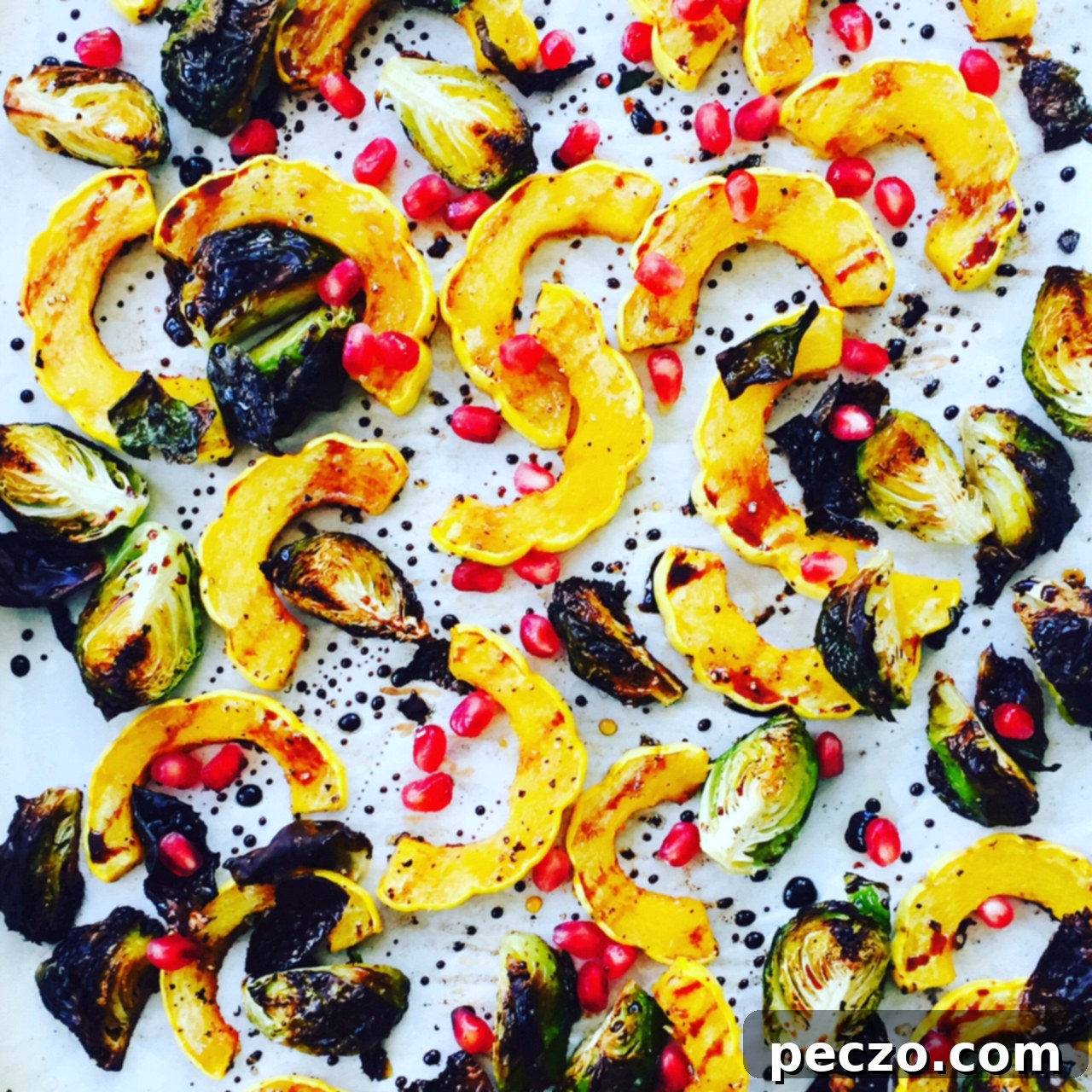The Ultimate Guide to Perfectly Roasted Delicata Squash and Brussels Sprouts
There’s an undeniable magic that happens when vegetables meet the high heat of an oven. While many vegetables are delightful in their raw state or prepared in other ways, roasting truly elevates them to new heights of deliciousness. A simple drizzle of oil, a sprinkle of salt, and a hot oven can transform almost any veggie into a caramelized, tender, and intensely flavorful experience. It’s a culinary alchemy that brings out natural sweetness and creates irresistible crispy edges.
And when it comes to visual appeal, imagine a spread of vibrant, perfectly roasted vegetables gracing your table. Wouldn’t this make the best culinary centerpiece? Or even just a stunning image on your screen, perhaps as your next desktop background, celebrating the beauty of simple, wholesome food?
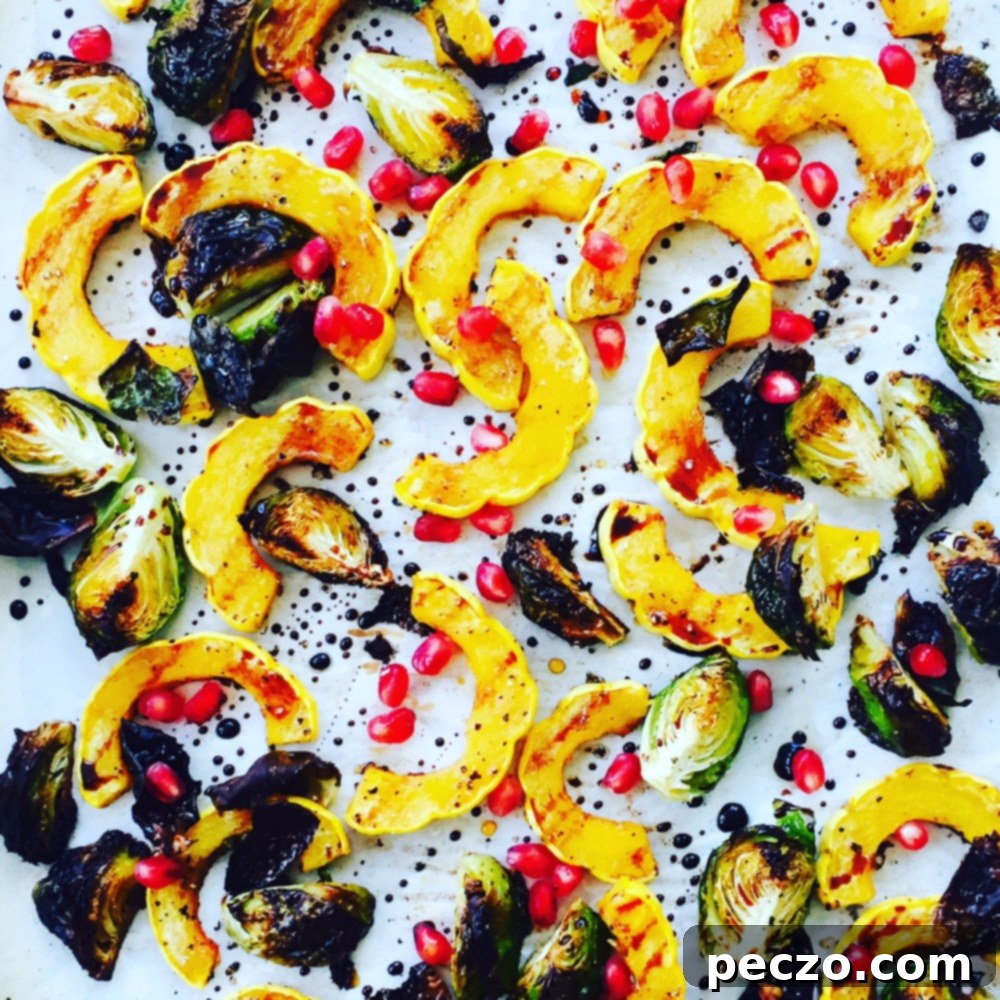
Discovering the Delight of Delicata Squash
Our star ingredient for this journey is the humble yet spectacular delicata squash. Often overlooked in favor of its more robust winter squash cousins like butternut or acorn, delicata offers a unique combination of ease and flavor that makes it a true weeknight hero. Its name, “delicata,” perfectly describes its delicate texture and subtly sweet taste, reminiscent of sweet potato or corn.
What sets delicata apart, and what makes it particularly appealing for roasting, is its remarkably thin and entirely edible skin. Unlike acorn or butternut squash, there’s no need for a wrestling match with a vegetable peeler or a struggle with a knife to remove a tough outer layer. Simply wash the squash, halve it lengthwise, scoop out the seeds with a spoon, and slice it into beautiful crescent moons. This feature alone significantly cuts down on prep time, making healthy eating more accessible and less daunting.
The skin, once roasted, becomes tender and adds a slight chewiness, contributing to the squash’s overall delightful texture. It’s a perfect halfway point between the very thin skin of a zucchini and the thicker, tougher skin of an acorn squash, offering the best of both worlds without any extra effort.
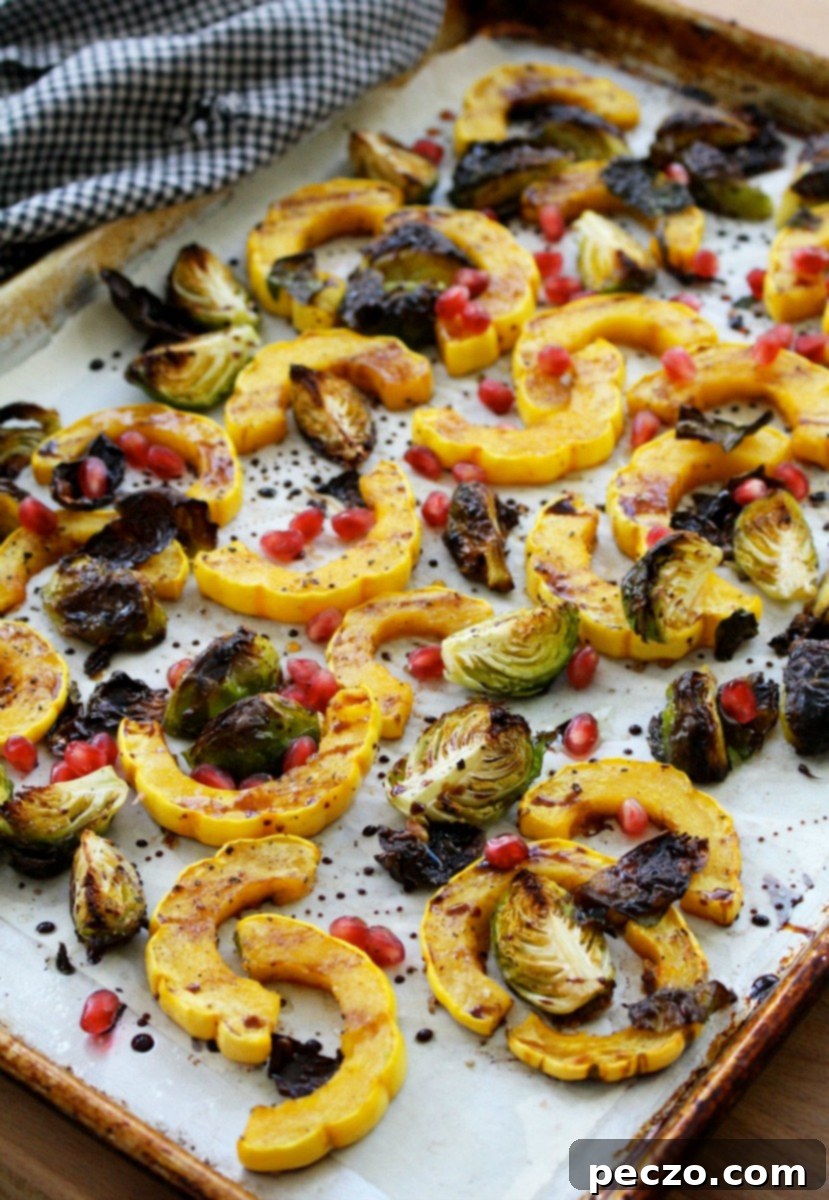
Beyond its ease of preparation, delicata squash is also a good size. Typically, it’s about twice the size of a standard zucchini, meaning one or two squashes can provide a generous side dish for a handful of people without overwhelming your grocery basket or leaving you with an excessive amount of leftovers (though, let’s be honest, there’s nothing wrong with delicious leftovers!). Its manageable size and effortless preparation make it an ideal choice for busy cooks looking for nourishing and flavorful options.
The Art of Roasting: A Simple Yet Profound Method
While we’re focusing on delicata squash and Brussels sprouts today, the beauty of roasting lies in its universal application. The core principles remain the same for almost any vegetable you choose. It’s less a strict recipe and more a set of intuitive instructions that yield consistently fantastic results. This method transforms simple ingredients into culinary masterpieces with minimal fuss.
Essential Roasting Principles:
- Preparation is Key: Begin by washing your vegetables thoroughly. For delicata, as mentioned, simply halve, deseed, and slice. For Brussels sprouts, trim the woody ends and halve or quarter them, depending on their size, to ensure even cooking and maximize surface area for caramelization.
- Don’t Crowd the Pan: This is perhaps the most crucial rule for achieving crispy, caramelized edges instead of steamed, limp vegetables. Spread your prepared vegetables out on a parchment-lined baking sheet in a single layer, ensuring there’s space between each piece. If your pan is too full, use a second baking sheet. Air circulation is your best friend here.
- Oil and Seasoning: Drizzle generously with a good quality oil. Olive oil is a classic choice, lending a rich flavor, but canola or avocado oil also work well due to their high smoke points. Toss the vegetables gently with your hands to ensure every piece is evenly coated. Then, sprinkle generously with salt. Freshly ground black pepper is also a welcome addition, and you can experiment with other herbs and spices like garlic powder, onion powder, smoked paprika, or dried thyme for added depth.
- High Heat is Your Friend: A preheated oven at 400-425°F (200-220°C) is ideal for roasting most vegetables. This high temperature helps to achieve that desirable browning and caramelization quickly, locking in flavor and creating a tender interior.
- Mind the Time: Roasting times vary depending on the vegetable and how small you’ve cut them. For delicata squash and Brussels sprouts, 20-30 minutes is usually sufficient. Midway through, if you remember, give the pan a good shake or stir the vegetables with a spatula to ensure even browning on all sides. The vegetables are done when they are tender when pierced with a fork and beautifully caramelized around the edges.
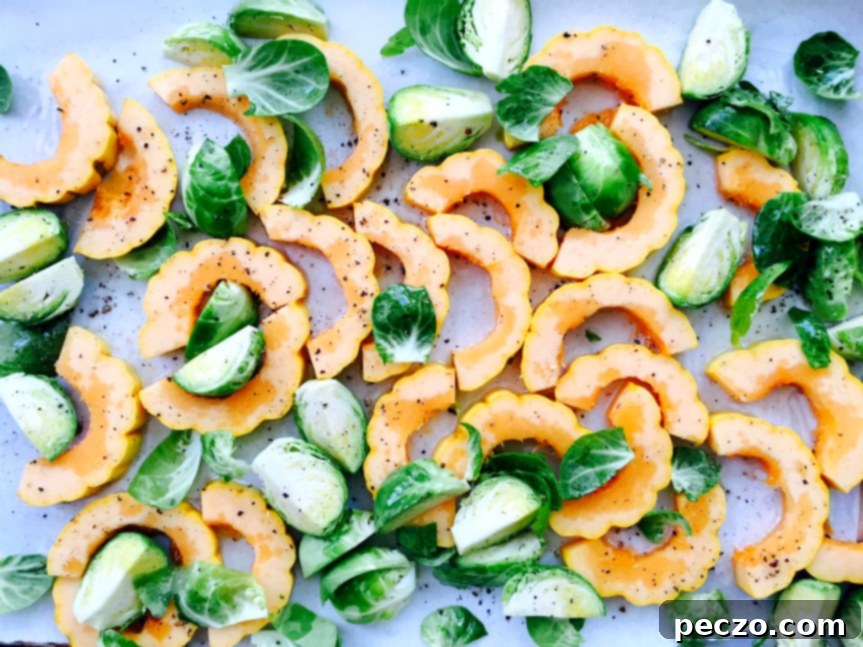
Combining Vegetables for Optimal Roasting
One common pitfall when roasting multiple types of vegetables together is uneven cooking. Some vegetables cook faster than others, leading to a mix of perfectly done pieces and either undercooked or overcooked ones. The trick is to combine vegetables with similar densities and cooking times. Think of it in terms of “hardy with hardy” and “fragile with fragile”:
- Hardy Vegetables: These include root vegetables and dense squashes like carrots, parsnips, sweet potatoes, potatoes, butternut squash, acorn squash, and of course, delicata squash. These can all be roasted together at high temperatures for similar durations. If you’re swapping delicata for another winter squash, remember you’ll likely need to peel the tougher-skinned varieties first.
- Fragile Vegetables: These are quicker-cooking vegetables like bell peppers, asparagus, zucchini, mushrooms, green beans, and cherry tomatoes. These should be roasted separately or added to the pan later if combined with hardy vegetables.
Brussels sprouts fall into a happy medium; they can usually be roasted effectively with hardy vegetables like delicata, as they soften and caramelize beautifully within a similar timeframe.
A Perfect Pairing: Delicata Squash and Brussels Sprouts
The combination of roasted delicata squash and Brussels sprouts is a match made in culinary heaven. The inherent sweetness of the roasted squash provides a wonderful contrast to the slightly earthy, nutty flavor of the Brussels sprouts. When roasted, Brussels sprouts shed their potential bitterness, becoming incredibly tender on the inside with wonderfully crispy, almost chip-like outer leaves. The caramelization process enhances both vegetables, creating a side dish that is both comforting and sophisticated.
Roasted Delicata Squash and Brussels Sprouts: Your Simple Guide
Here’s how to bring this delightful duo to life in your kitchen:
Ingredients:
- 1 medium delicata squash
- 1 pound fresh Brussels sprouts
- 2-3 tablespoons olive oil (or canola/avocado oil)
- 1/2 teaspoon sea salt (or to taste)
- 1/4 teaspoon black pepper (optional)
Instructions:
- Preheat your oven to 425°F (220°C). Line a large baking sheet with parchment paper for easy cleanup. If you have a lot of vegetables, use two baking sheets to avoid crowding.
- Prepare the delicata squash: Wash thoroughly. Carefully halve the squash lengthwise. Using a spoon, scoop out the seeds and fibrous strands. Slice the squash into ½-inch thick crescent-shaped pieces.
- Prepare the Brussels sprouts: Trim the woody ends off the Brussels sprouts. Remove any loose or discolored outer leaves. For larger sprouts, halve or quarter them; for smaller ones, you can leave them whole.
- Combine and Season: Place the sliced delicata squash and prepared Brussels sprouts on the parchment-lined baking sheet. Drizzle with olive oil and sprinkle generously with salt and pepper (if using). Use your hands to toss everything together, ensuring all the vegetables are evenly coated with oil and seasoning.
- Roast: Arrange the seasoned vegetables in a single layer on the baking sheet, making sure they are not overlapping. Roast in the preheated oven for 20-30 minutes, or until the squash is tender and caramelized at the edges, and the Brussels sprouts are tender-crisp and browned. For more even cooking, you can stir or shake the pan once or twice during roasting.
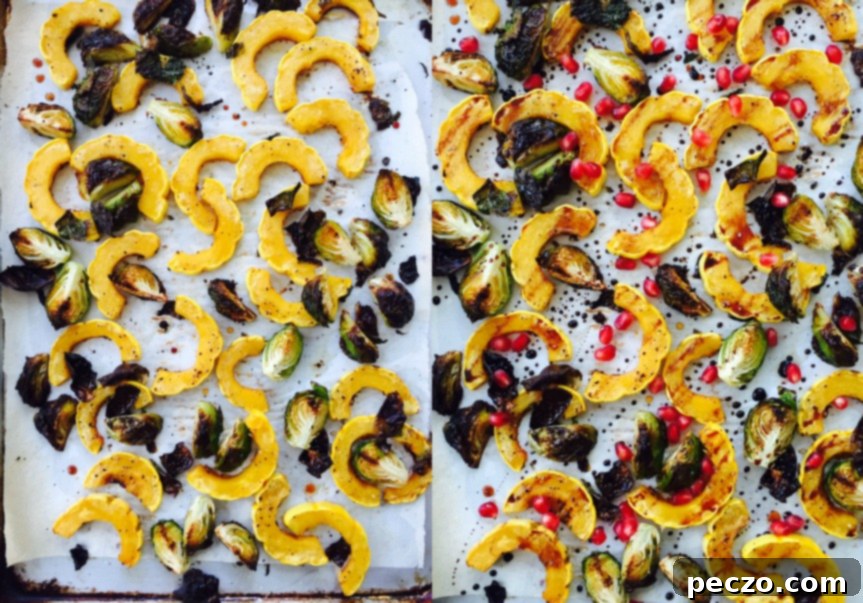
Elevating Your Roasted Vegetables: Finishing Touches
While simply roasted vegetables are incredibly satisfying on their own, a few final touches can transform them from a delicious side dish into a truly memorable culinary experience. These additions can introduce new layers of flavor, texture, and visual appeal, turning your roasted medley into a vibrant masterpiece.
For this particular batch of delicata and Brussels sprouts, a drizzle of store-bought balsamic reduction (the syrupy, concentrated kind) and a generous scattering of ruby-red pomegranate seeds added a beautiful sweet-tart complexity and a stunning visual contrast. The rich, tangy glaze complements the sweetness of the squash and the earthiness of the sprouts, while the pomegranate seeds provide a delightful burst of juiciness and a vibrant pop of color, making the dish look almost like a modern art painting – perhaps a culinary Jackson Pollock!
Other Ideas for Finishing Touches:
- Fresh Herbs: A sprinkle of fresh chopped parsley, thyme, rosemary, or sage after roasting brightens the flavors and adds a fragrant aroma.
- Citrus Zest: A grating of lemon or orange zest provides a refreshing, zesty counterpoint.
- Nuts or Seeds: Toasted pecans, walnuts, slivered almonds, or pumpkin seeds (pepitas) add a delightful crunch and nutty flavor.
- Cheese: A sprinkle of grated Parmesan, crumbled goat cheese, or feta cheese can introduce a savory, creamy, or tangy element.
- Spicy Kick: A pinch of red pepper flakes or a drizzle of hot honey can add a pleasant heat.
- Sweetness: A light drizzle of maple syrup or honey can enhance the natural sweetness, particularly good with squash and carrots.
Beyond Delicata: Endless Roasting Possibilities
Once you master the simple art of roasting, a world of culinary possibilities opens up. Don’t limit yourself to just squash and sprouts! Experiment with a variety of vegetables to discover new favorites and expand your repertoire.
- Root Vegetables: Carrots, parsnips, sweet potatoes, turnips, and even radishes (they mellow beautifully when roasted) are fantastic when roasted. Cut them into similar-sized pieces for even cooking.
- Cruciferous Vegetables: Broccoli, cauliflower, cabbage wedges, and kale all become incredibly flavorful and slightly crispy when roasted.
- Alliums: Onions (red, yellow, or pearl), leeks, and even garlic cloves (whole or minced) can be roasted alongside other vegetables, adding depth and sweetness.
- Soft Vegetables: Zucchini, bell peppers, asparagus, green beans, and cherry tomatoes roast quickly and are best cooked for a shorter duration or with other quick-cooking companions.
The beauty of roasting is its forgiving nature and adaptability. It’s a method that encourages experimentation and allows the natural flavors of the vegetables to truly shine through. Whether you’re preparing a simple weeknight meal or an elaborate holiday feast, perfectly roasted vegetables are always a welcome addition, offering both wholesome nutrition and irresistible taste.
So, preheat your oven, gather your favorite vegetables, and get ready to transform them into something truly spectacular. Happy roasting!
